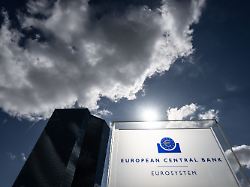For the tenth time in a row
ECB increases key interest rate again – business agrees
September 14, 2023, 2:16 p.m
Listen to article
This audio version was artificially generated. More info | Send feedback
The European Central Bank is continuing its interest rate hikes. For the tenth time in a row, it is raising the key interest rate, from 4.25 to 4.5 percent. Many observers expect that this will mean that interest rates have reached a plateau.
In the fight against inflation, the European Central Bank (ECB) has raised interest rates for the tenth time in a row. At their first interest rate meeting after the summer break, the euro watchdogs led by central bank chief Christine Lagarde decided to increase the key rates again by a quarter of a percentage point, as in July. The key interest rate will rise to 4.50 from the previous 4.25 percent. Largely approved by representatives from business and finance.
The key deposit rate on the financial market, which financial institutions receive from the central bank for parking excess funds, will rise from 3.75 to 4 percent. This is the highest level since the start of the monetary union in 1999. “When determining the appropriate level and duration of the restrictive level, the ECB Governing Council will continue to pursue a data-based approach,” the monetary authorities said.
Many economists assume that the euro watchdogs have reached the interest rate peak on their tightening course initiated in the summer of 2022 with a deposit rate of now four percent. They expect the ECB to keep the key rate at this level for a longer period of time to further curb inflation.
After the previous meeting of the Governing Council at the end of July, ECB President Christine Lagarde had not ruled out both a further interest rate hike and a pause in the unprecedented series of hikes for the September meeting. At that time, the French only rejected a reduction in interest rates.
“ECB leaves no doubt about its determination”
“The ECB does not want to leave any doubts about its determination in the fight against inflation,” said the President of the German Savings Banks and Giro Association, Helmut Schleweis. However, the central bankers are unlikely to go too far with further interest rate increases. “Otherwise they would dampen the economy too much.”
The German Chamber of Commerce and Industry (DIHK) showed understanding for the interest rate move, but also expects more pressure on companies. “The dry spell will be even longer for companies in Germany – even if the message about combating excessive inflation is important,” said DIHK General Manager Martin Wansleben. “This means that the financing conditions for companies will become even worse.”
“Now the moment could have been reached from which interest rates will be maintained at the level they have now reached for a longer period of time, well into next year,” said the general manager of the General Association of the German Insurance Industry, Jörg Asmussen. “With the renewed, but probably last, interest rate increase,” the ECB is “rightly making progress on its path to combating inflation.”
ECB more pessimistic about inflation
According to the ECB, high inflation in the euro area will decline more slowly than expected three months ago. The central bank now expects an inflation rate of 5.6 percent for the current year. In its June forecast, the ECB had assumed inflation to be 5.4 percent on average for 2023. The central bank also predicts a higher inflation rate of 3.2 (June forecast: 3.0) percent for 2024; a slightly lower rate of 2.1 (2.2) percent is now expected for 2025. The ECB is aiming for a stable price level in the medium term with an annual inflation rate of 2 percent for the currency area of the 20 countries.
According to the latest ECB forecast, the economy in the euro area will grow by 0.7 percent this year, slightly weaker than the 0.9 percent predicted in June. Next year, gross domestic product is expected to increase by 1.0 (June forecast: 1.5) percent. For 2025, the ECB expects economic output to grow by 1.5 (1.6) percent in the currency area.
In the USA, the next interest rate decision is due on September 20th. Since the beginning of 2022, the US Federal Reserve (Fed) has aggressively raised interest rates from close to zero to a range of 5.25 to 5.50 percent in order to dampen inflation and cool down the hot labor market. According to experts, the recently increased unemployment rate and the ebbing boom in the job market provide the US monetary authorities around Fed Chairman Jerome Powell with arguments for a break in interest rates.
